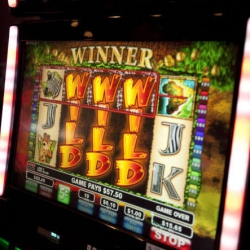The City Council of Washington, Illinois put a two-month moratorium on issuing new video gambling licenses. The city currently has 39 video gambling machines in nine licensed video gambling establishments.
Officials chose to put a pause on new licensing, because video gambling machines have become controversial of late. The moratorium was enacted last week, allowing City Clerk Pat Brown, Washington Police Chief Mike McCoy, and Master Sgt. Jeff Stevens to study the issue in greater detail.
Pros and Cons of Video Gambling Machines
Proponents claim VGMs help local small business owners make enough cash to stay in business. Opponents of VGMs point to problem gambling concerns and other drawbacks to the community, which is 12 miles from Peoria, Illinois.
To the opponents of machine gaming expansion, the spread of gambling cafes in the local area are a detraction — not an asset. Police Chief McCoy and Master Sgt. Stevens wrote a memo to the Washington City Council which said, “In this context, a gambling cafe does not contribute to the fabric of the city.”
“The Video Gambling Capitol of the World”
Mayor Gary Manier justified the 2-month moratorium by implying video gambling licensing was getting out of control. Mayor Manier said during one hearing, “We don’t want to be known as the video gambling capitol of the world. We allow video gambling to help our local businesses by increasing their revenue.”
That was not likely to be the case. The nearby community of Pekin (population: 34,094), located 22 miles from Washington, has 149 video gambling machines. Those machines are located in 23 bars and 10 video gambling cafes.
Pekin VGM Licenses
Billie Ingles, the Pekin Police Department’s public information officer, said that demand for more VGMs is limited. Ingles said, “There hasn’t been an excess of calls for service at the cafes.”
Washington, with a population of around 15,000, has half as many establishments which might apply to be a video gambling establishment. Gary Manier’s complaint seemed to focus on the lack of revenue the city gets from video gambling cafes.
In a recent city council meeting to discuss the proposed moratorium, Manier said, “Communities get 5 percent of the profit from each video gambling machine, the state gets 25 percent, and of the remaining 70 percent, 35 percent goes to the business owner and 35 percent to the owner of the machine.”
“That Really Bothers Chief McCoy”
The mayor suggested Washington‘s police chief agreed with his point of view. Mayor Manier said, “That means 60 percent of the revenue from each machine is leaving our city. That’s something that really bothers Chief McCoy.”
Sgt. Jeff Stevens seemed to agree with the police chief. Stevens argued that the city does not have the resources to provide the proper form of oversight for video gambling cafes. Stevens said, “So this is a good time to declare a moratorium, look at our ordinance, and make sure it’s shaped the way we want it. We don’t have a department of gambling in the city to constantly oversee video gambling.”
No New License Applications Since September 2016
Others suggested that the moratorium was perplexing, because no one had filed for a new license since September 2016. Since the city had not received a request for a VGM license in 11 months, a 2-month moratorium seemed inexplicable.
The city leaders’ response to the VGM industry might seem inexplicable to outsiders, but Washington, Illinois’ VGM controversy mirrors the kind of issues cities and towns throughout Illinois have faced since VGMs were legalized.
Some counties have one city which bans video gambling machines, which means residents drive to other cities to gamble on VGMs. That means capital flight, yet city leaders want to take a moral stand. Even if it costs the city government and its businesses some cash, residents want to see their leaders take that stand.

